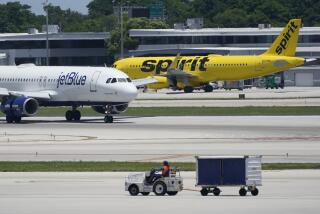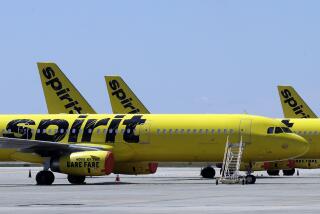British Air Ends Bid for USAir Stake
- Share via
British Airways, facing probable U.S. government rejection, dropped its bid to buy a large stake in USAir on Tuesday. But the failure of the deal is not likely to stop other American carriers from seeking partnerships with foreign airlines.
The proposed alliance, which would have been the largest in aviation history, set off a fierce battle over access to international skyways that is likely to be fought again on different fronts--and perhaps with different outcomes--as the airline industry continues its global consolidation.
The $750-million deal would have given British Airways a 44% equity interest in USAir. It would have allowed air travelers in dozens of smaller U.S. cities served by USAir to fly to London on one ticket, and spend less time waiting around in airports for connecting flights.
British Airways, which currently cannot carry passengers between U.S. cities, would have gained access to thousands of new customers. USAir, which has lost more than $800 million in the last three years, would have used the cash infusion to ensure its survival in the increasingly competitive industry.
But other U.S. carriers opposed the transaction, which required a review by the Transportation Department to ensure that it did not violate the U.S. law prohibiting foreign control of U.S. airlines. American Airlines, United Airlines, and Delta Air Lines insisted that Britain should be forced to relax the restrictions on foreign airlines at its airports in exchange for allowing British Airways a foothold in the U.S. market.
Not anxious for more competition in its home market, British Airways opposed such moves, and nearly six months of negotiations finally ended in stalemate when the U.S. Department of Transportation indicated it would block the transaction.
“I told (U.K. transportation secretary) John MacGregor that I was not optimistic,” Transportation Secretary Andrew H. Card Jr. said in Washington on Tuesday. “In the context of the existing bilateral agreement (with Britain), I would not have been able to approve the USAir-British Airways agreement.”
Some industry analysts say the U.S. government’s stance sends a discouraging signal regarding foreign investment in U.S. carriers at a time when the troubled industry desperately needs injections of capital. Future attempts to pair a U.S. airline with a foreign carrier would presumably face similar obstacles.
But for British Airways, which has made a series of airline acquisitions in other countries recently, abandoning the U.S. market would mean a radical change in its global strategy. The British firm left open the possibility for a new agreement with USAir or another American airline Tuesday.
And with other foreign carriers anxious to gain access to the lucrative U.S. market, the growing pressure to form international alliances may push the industry further toward the long-elusive “open skies.”
While USAir and British Airways may still work together in the form of a joint marketing agreement, analysts said both airlines may look for other partners. Lufthansa, which once contemplated buying Continental Airlines, is a likely candidate for a new deal with USAir. And several U.S. carriers such as Trans World Airlines, are hungry for cash and the opportunity to work with a European carrier.
But in an industry that appears to be in the midst of a massive consolidation into a few dominant worldwide carriers, such alliances will be carefully weighed against the risks of opening up domestic markets to foreign competition.
Transportation Secretary Card holds out the agreement approved last month that allows KLM Royal Dutch Airlines and financially troubled Northwest Airlines to operate as a single airline as a model, noting that the United States and the Netherlands have agreed to give unlimited access to each other’s airline markets.
Times staff writer Matt Marshall in Washington contributed to this story.
More to Read
Inside the business of entertainment
The Wide Shot brings you news, analysis and insights on everything from streaming wars to production — and what it all means for the future.
You may occasionally receive promotional content from the Los Angeles Times.










